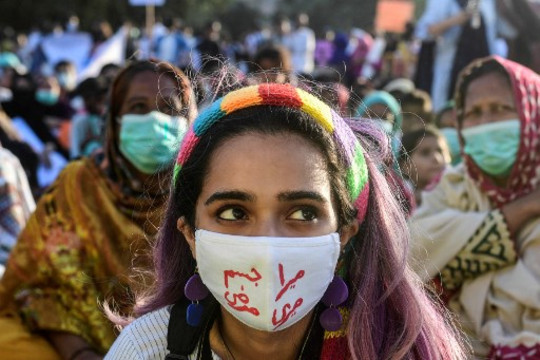In the last decade of the 20th century, the media evolved greatly due to the global information revolution. Pakistan saw a mushroom growth of print and electronic news media houses – that subsided after the 2010s.
Due to this growth, the centralised information management system in Pakistan could not maintain its hold on information as before. However, the unlimited opportunities to spread one's message through various media platforms emerging after the information revolution also resulted in a surge in governmental steps to control the flow of information.
Alongside these fundamental changes, we saw a significant growth in women's employment in media houses generally, and more specifically in news media. However, a comprehensive study is needed to ascertain the number of women media workers and their working conditions.
Female media workers are participating in a variety of roles, from technical jobs such as camera handling, editing, and engineering to news content and feature programming. Women are also mainstream journalists working on the frontline, covering conflicts, natural disasters and political conflicts.
Although the terms and working conditions of women in the media are consistent with the labour and women's rights in Pakistan, we need to investigate whether they are treated equally and without discrimination in the workplace, as our society does not treat women as equals.
Basic accommodations such as the provision of separate toilets in the workplace, provision of maternity leave and childcare are important rights to be monitored closely so that an enabling environment can be created for women in Pakistan’s media organizations.
The legal framework for workers’ rights in Pakistan
Pakistan is a member of the International Labour Organization (ILO) and has ratified the core labour rights conventions, which include non-discrimination, right of association and provision of social protection. Pakistan is also a signatory to the Convention Against All Forms of Discrimination Against Women (CEDAW) and signed the Generalised Scheme of Preferences Plus with the European Union, which is a comprehensive treaty that includes 27 international conventions about human rights that comprise fundamental labour rights and women rights.
The Constitution of Pakistan has also guaranteed protection from discrimination to all its citizens including women and labour. Social protection is not part of the fundamental rights guaranteed in the Constitution. Following the 18th Constitutional amendment in 2010, labour and women have become provincial subjects.
Despite the above-mentioned framework, laws and policies regarding labour and women in Pakistan have failed to ensure the provision of rights to the workers and women and other marginalised sections of society.
There is a long list of laws such as the Standing Orders Act, 2015 and Shops and Establishment Act 2015 which are relevant to the terms and working conditions at work and social security institutions such as the Minimum Wage Board; Employees Social Security Institutions; Maternity Benefits Act, 2017 which provides at least 4 months paid leave to women workers and at least 10 days’ paternity leave to male employees.
A culture resistant to change
There is very little implementation of the maternity benefits law, women workers often have to leave their jobs and fend for re-employment after childbirth. They also face discrimination in the determination of wages and placements. Men tend to get decision-making positions while women serve in the lower categories of employment.
Provincial trade union laws also exist to define the formation of workers’ organisations, but at the moment only 1% of the labour force is organised in unions in Pakistan. Journalist unions in Pakistan are very weak and cannot protect workers from retrenchments and layoffs. Women are side-lined for leadership despite being educated and often well versed in the relevant laws.
Sexual harassment is a serious issue in Pakistan. With awareness, things are changing, but ever so slowly. A law for prevention against sexual harassment in the workplace has been passed, and provisional and federal ombudspersons are being appointed to combat the menace of sexual harassment at the workplace. Although, there is some progress on this front, a lot has to be done to not only raise the awareness of working media persons on all the concerned labour laws.
News media workers' awareness is not only important to secure their labour rights but it will also help them to increase the awareness of the general public on labour rights in Pakistan.
While most media workers are working for the private sector, the public sector also hires news media workers. Permanent public sector employees are less vulnerable than their private sector and contract sector counterparts.
The government is not focussed on these issues faced by the media and has been unable to improve the situation despite making big promises. The last wage board award was announced by the federal government in 2019. According to this award, the benchmark was the government's minimum wage (which at the moment is between PKR 20,000-25,000 or USD 117-146). Traditionally, the minimum wage is announced as part of the federal budget and is considered to be much lower than appropriate.
Pakistani media workers have seen many setbacks in recent years. There have been massive pay cuts as high as 50% in some organisations. Over the last three to four years the number of retrenchments and layoffs have increased, resulting in greater levels of unemployment and uncertainty among media workers in Pakistan.
There is no - or very little - implementation of laws that can help to improve the state of the workers. Workers face issues like not being given employment contracts and or being registered under social security schemes. The unionisation process is hampered because, as per the law, union members are bound to be recognised by their employers.
Farhat Perveen is an expert on labour and women’s rights in Pakistan and the founding executive director of the National Organisation for Working Communities.

